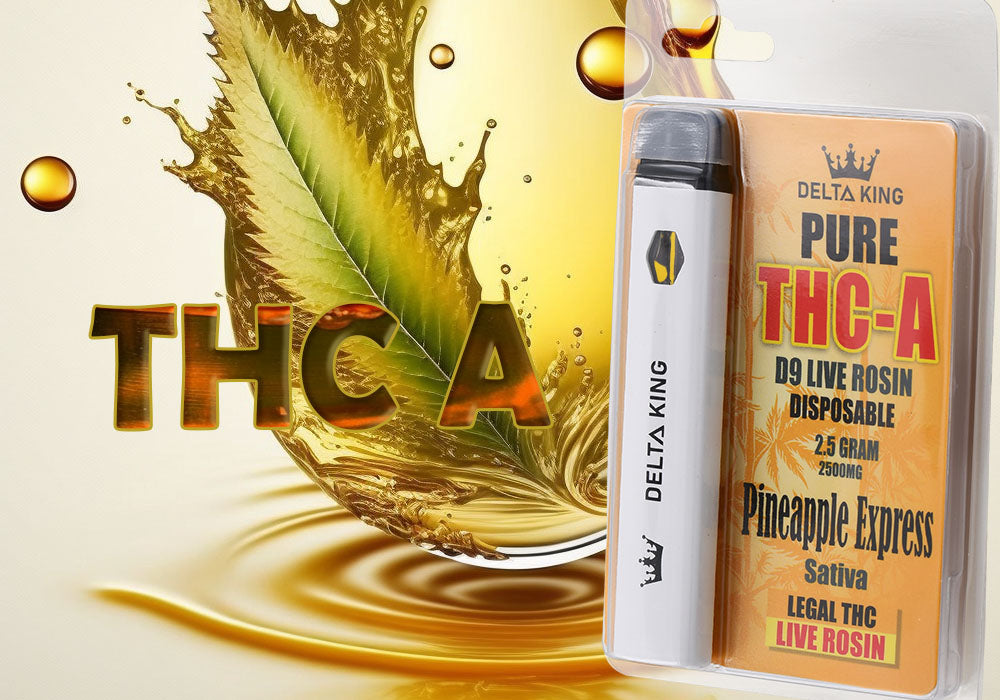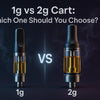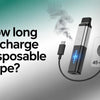THC vs. THCA: Understanding the Differences and Benefits

THC vs. THCA: Understanding the Differences and Benefits
Hey there! If you're diving into the world of cannabis products, you might have come across terms like THC and THCA. But what do they mean, and how do they affect you?
This blog is your go-to guide to understanding these cannabinoids and how they can enhance your lifestyle. Plus, we’ll explore some of the hottest products on the market, including THC Vapes, Delta 10 Gummies, and Delta 8 cartridges.
THC: The Buzz Creator
Let's start with THC, or Tetrahydrocannabinol, the main psychoactive component of cannabis that gives you the "high." THC is what most people are after when they reach for products like Delta 8 Disposable pens or Delta 10 Vapes.
It works by interacting with your body’s endocannabinoid system, affecting your brain’s release of dopamine—hello, feelings of euphoria and relaxation! THC is available in various forms, from oils and tinctures to edibles and vapes, with indica vape carts being a popular choice for those who prefer a smooth, relaxing experience. This makes it super versatile for your personal preference.
THCA: The Raw Precursor
On the flip side, THCA, or Tetrahydrocannabinolic acid, is the non-psychoactive precursor found in raw and unprocessed cannabis. When cannabis is heated (like when you smoke or vaporize), THCA converts into THC. But before it's heated, THCA has its benefits, including anti-inflammatory and neuroprotective properties.
It's gaining attention for those interested in the therapeutic aspects of cannabis without the high. For a smooth and straightforward experience, THCA Vapes are becoming popular, allowing users to enjoy the benefits conveniently and discreetly.
Comparing THC and THCA
Key Differences
1. Psychoactivity:
THC is psychoactive, which means it affects the mind and alters consciousness. In contrast, THCA does not produce these effects unless it is converted into THC.
2. Therapeutic Benefits:
Both compounds are believed to offer medicinal benefits, but they do so in different ways. THC is often used to help with conditions like pain, insomnia, nausea, and lack of appetite. THCA has been researched for its potential to help with inflammation in neurodegenerative diseases and its anti-proliferative qualities, which could benefit cancer treatment.
3. Availability and Use:
THC is widely available in various forms, including oils, edibles, and vapes. THCA is primarily available in raw cannabis products and requires careful storage to prevent conversion into THC.
4. Legal Status:
Due to its psychoactive nature, THC is heavily regulated and not legal in all regions. THCA, being non-psychoactive, typically faces fewer legal restrictions.
Benefits of THC:
-
Pain Relief: THC is renowned for its analgesic properties, making it a common choice for chronic pain management.
-
Mental Health Management: It can be effective in reducing symptoms of anxiety and depression in some users.
-
Appetite Stimulation: THC is often used to increase appetite in conditions like cancer and AIDS.
-
Sleep Aid: Its sedative effects are helpful for people with insomnia or sleep disturbances.
- Nausea Relief: THC can reduce nausea and vomiting, especially for chemotherapy patients.
Benefits of THCA:
-
Anti-Inflammatory: THCA has potent anti-inflammatory properties, which can help with conditions like arthritis and lupus.
-
Neuroprotective: THCA may help protect brain cells and promote neurological health.
-
Anti-Proliferative: Early studies indicate that THCA might inhibit the growth of cancer cells, making it a potential tool in cancer treatment.
- Non-Psychoactive Therapy: For patients interested in the therapeutic benefits of cannabis without the psychoactive effects, THCA provides an appealing option.
Why Choose THC or THCA Products?
Choosing between THC and THCA products depends on what you're looking for in your cannabis experience. If you’re all about that high and relaxation, reaching for a Delta 8 cartridge or trying out some Delta 10 Gummies might be your best bet. These products deliver the psychoactive effects of THC, perfect for unwinding after a long day or getting into a creative mood.
However, if you're more into the health benefits without the high, THCA products are worth a look. You won't find the psychoactive effects here, but you might discover an ally in your wellness routine. THCA vapes are an excellent method for experiencing these benefits, and you can easily find them at our online Delta vape shop, where convenience meets quality.
How to Choose the Right Product
Choosing the right cannabis product is crucial to ensuring that you get the most benefit and enjoyment from your experience. Whether you’re exploring THC for its psychoactive effects or THCA for its health benefits, a few key factors can guide your decision, with classic options like the og kush vape offering a reliable balance of flavor and effect.
Consider Your Desired Effects
What are you looking to achieve? If you’re interested in the psychoactive effects of THC, products like THC Vapes, Delta 10 Vapes, or Delta 8 cartridges may be ideal. These options will provide the “high” associated with THC, which can help with relaxation, creativity, and even social comfort.
On the other hand, if you're looking for health benefits without the high, THCA products like THCA Vapes are your best bet. These can offer anti-inflammatory benefits, neuroprotective properties, and other medicinal effects without altering your mental state.
Method of Consumption
How do you prefer to consume cannabis? This can significantly influence the type of product you choose. Vaping is popular due to its ease of use and rapid onset of effects. Products like THC Vapes and Delta 8 Disposable devices offer a convenient and discrete way to consume cannabis. Edibles like Delta 10 Gummies provide longer-lasting effects and are a good choice if you prefer not to inhale anything.
If you are new to cannabis and prefer to avoid the psychoactive effects, raw cannabis in the form of juices or salads might be an excellent way to consume THCA. Remember, heating cannabis converts THCA into THC, so it’s essential to consume it raw if you want to enjoy the benefits of THCA without psychoactivity.
Legality and Accessibility
Check the legal status of THC and THCA products in your area. THC's psychoactive nature means it is more strictly regulated, and not all THC products are legal everywhere. THCA is usually less restricted but may have some regulations depending on your location. Always ensure you’re purchasing and using these products legally to avoid legal issues.
Quality and Purity
Opt for products from reputable sources. The quality of cannabis products can vary widely between brands and suppliers. Look for products that provide transparent information about their cultivation, production processes, and third-party lab test results. This information can help you assess the purity and safety of the product, ensuring that you’re consuming something free from harmful contaminants like pesticides and heavy metals.
Start Slow
If you’re new to cannabis, start with a lower dose and increase gradually. This is especially important with THC-containing products, as it can help you gauge your tolerance and avoid unwanted side effects. Even with non-psychoactive THCA, starting slow allows you to observe how your body reacts and adjust your dosage accordingly.
What’s Trending?
Delta 8 Disposable:
These are perfect for those who want a manageable high with convenience. Delta 8 provides a milder high compared to Delta 9 THC, making it a popular choice for those new to cannabis or who have mild anxiety about the psychoactive effects.
Delta 10 Gummies:
For a fun and tasty way to get a THC dose, Delta 10 gummies offer a light high with a focus on boosting mood and creativity.
Conclusion
Understanding the differences between THC and THCA is crucial for making informed decisions about cannabis. Whether you're here for the high or the health benefits, there’s a product tailored just for your needs. Dive into the world of THC with some fun and potent Delta 10 Vapes, or keep it health-focused with THCA Vapes.
Whatever you choose, you’re in for a treat. Explore our selection today and find the perfect match for your cannabis journey! Happy exploring!
FAQs
Q1: What are the main differences between THC and THCA?
A1: THC (Tetrahydrocannabinol) is the psychoactive compound in cannabis that produces a "high," affecting mood and perception. THCA (Tetrahydrocannabinolic acid) is the non-psychoactive precursor to THC found in raw cannabis. THCA converts to THC when exposed to heat, a process known as decarboxylation.
Q2: How do I choose between THC and THCA?
A2: Your choice depends on the effects you seek. If you're looking for psychoactive effects to aid with issues like pain, insomnia, or lack of appetite, THC is suitable. If you prefer non-psychoactive benefits for inflammation or neuroprotection without the high, opt for THCA.
Q3: What does the future hold for research on THC and THCA?
A3: Research is expected to expand, especially on THCA, which is less studied than THC. Future studies will likely explore the full therapeutic potential of THCA, particularly its anti-inflammatory, neuroprotective, and anti-proliferative properties.
Q4: Can I find THCA in regular cannabis products?
A4: THCA is primarily found in raw, unheated cannabis products. Regular cannabis products meant for smoking, vaping, or cooking mainly contain THC, not THCA because the heating process converts THCA into THC.
Q5: How long does it take for THCA to convert into THC?
A5: The conversion rate of THCA to THC depends on the temperature and duration of heat exposure. Smoking or vaping can convert THCA almost instantly, while the process might take longer when baking cannabis in edibles, typically around 30 to 40 minutes at oven temperatures.





